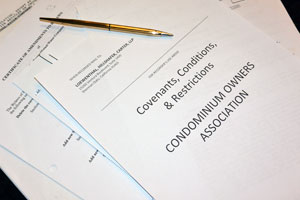LHC Newsletter Vol. 5, No. 4
“Everything you always wanted to know about Operating Rules.”
By David, A. Loewenthal, Esq.
Operating Rules are a tool frequently used by a Board of Directors of an Association in attempting to better manage and operate the common interest development. Unlike Covenants, Conditions and Restrictions that require membership approval, Operating Rules can be drafted and adopted by the Board of Directors unilaterally, subject to providing notice and comment period to the membership.
Civil Code section 1357.100 defines Operating Rules as follows:
- “Operating” means a regulation adopted by the Board of Directors of the Association that applies generally to the management and operation of the common interest development or the conduct of the business and affairs of the Association.”
- “Rule Change” means the adoption, amendment or repeal of an operating rule by the Board of Directors of the Association.
Civil Code section 1357.110 – enforceability of an operating rule:
- In writing
- Authority of the Board of Directors
- Not inconsistent with the governing documents
- Adopted in good faith and in substantial compliance with the requirements of this Article
- Reasonable
Determining Reasonableness of a Rule:
In order for a rule to be deemed valid, it must be reasonable. The Courts have interpreted the issue of reasonableness in several cases:
Nahrstedt v. Lakeside Village – The restriction is presumed to be reasonable and will be enforced uniformly against all residents of the common interest development unless the restriction is arbitrary, and poses burdens on the use of land that it affects that substantially outweigh the restrictions
benefits to the developments, residents, or violates a fundamental public policy.
Deferential standards of equitable servitude law.
Liebler v. Point Loma Tennis Club – “The framework of reference, as the court made clear, is not the reasonableness specific to the objecting homeowner, but reasonableness to the common interest development as a whole.”
Standard of Review for an Operating Rule:
Courts will find a rule to be reasonable if it is applied in good faith, not arbitrary or capricious, and by procedures which are fair and uniformly applied.
What Constitutes A Rule Change?
- Architectural Rules.
- Standard Rules and Regulations (including: pets, people and parking).
- Collection Policy and standards for delinquent assessment payment plans or procedures adopted by the Association for resolution of assessment dispute.
- Election Rules.
- Any rule intended to cover the use of common area or exclusive use common area.
- Enforcement procedures, fine schedule and anything related to member discipline, including any scheduled monetary penalties for violation of the Governing Documents and any procedure for imposition of penalties
Starting the Rule-Making Process:
Delivery of Notices – Civil Code §1350.7 identifies the method of delivering notices and documents to the membership related to the rule-making process as follows:
Civil Code §1350.7. Methods of Document Delivery.
(a) This section applies to delivery of a document listed in Section 1363.005 or to the extent the section is made applicable by another provision of this title.
(b) A document shall be delivered by one or more of the following methods:
(1) Personal delivery.
(2) First-class mail, postage prepaid, addressed to a member at the address last shown on the books of the association or otherwise provided by the member. Delivery is deemed to be complete on deposit into the United States mail.
(3) E-mail, facsimile, or other electronic means, if the recipient has agreed to that method of delivery. The
agreement obtained by the association shall be consistent with the conditions for obtaining consumer consent described in Section 20 of the Corporations Code. If a document is delivered by electronic means, delivery is complete at the time of transmission.
(4) By publication in a periodical that is circulated primarily to members of the association.
(5) If the association broadcasts television programming for the purpose of distributing information on association business to its members, by inclusion in the programming.
(6) A method of delivery provided in a recorded provision of the governing documents.
(7) Any other method of delivery, provided that the recipient has agreed to that method of delivery.
Notice and Members Right To Attend Board Meetings Where Rule Change Is To Be Considered By The Board:
- Unless circumstances demand otherwise, the Board’s decision to draft a proposed rule change should be made at an open meeting, pursuant to Civil Code section 1363.05 and then sent to the members for the thirty (30) day comment period.
- A more liberal approach to this decision making process is that if the Board has agreed, via unanimous written consent, to the draft Rule and Regulation,
then such draft rule can then be sent to the membership for its thirty (30) day comment period. Again, unless there are extenuating circumstances, the decision to draft the rule and then send it to the membership should be conducted via an open meeting. - The one exception to the above would be an emergency rule pursuant to Civil Code section 1357.130(d).
- Civil Code section 1357.130(b )pertains to the notice of a proposed rule change and states: “A decision on a proposed rule change shall be made at a meeting of the Board of Directors, after consideration of any comments made by Association members.”
- The Board of Directors must permit comments from the members at an open meeting. In addition, the Board cannot take action until members have had the ability to comment on the rule change within the specified time frame notice set forth within Civil
- Code section 1357.130 (minimum 30 days).
If the rule that was presented to the members is modified by the Board prior to the time that the Board is voting to adopt the rule, then the Board should:
- Send any rule change back to the membership for another thirty (30) day comment period and then reset the board meeting for a vote on the new rule language.
-
The exception would be if the modification to the rule from what was originally sent to the members is not substantive (e.g.: spelling error) or substantially within the confines of what the rules original intent and description was.
Notice to Members Of Adoption of the Rule:
- Civil Code section 1357.130(c) – Timing – Deliver notice to members of any rule changes within fifteen (15) days
- Civil Code section 1357.130(d) – Emergency Rules – Notice shall include text of the rule change; a description of its purpose; effect of the rule change; and date of rule change expiration.
Emergency Rules:
The Thirty (30) Day Member Notice and Comment Requirement does not apply to emergency rules which need to be adopted to address an imminent threat to public health or safety or imminent risk of substantial economic loss to the Association. If the board determines that an immediate rule change is required to address this emergency situation, it may make the emergency rule change and no notice is required to be given to the membership or any provision for them to comment at an open meeting.
However, an emergency rule change is only effective for one hundred twenty (120) days unless the rule change provides for a shorter effective period. Furthermore, an emergency rule cannot be readopted and, therefore, if there is a need for the emergency rule to last for more than one hundred twenty
(120) day limitation, the board should process the emergency rule as a permanent rule during the one hundred twenty (120) day period of time.
If the emergency rule is adopted, the board must still provide notice of the adoption of the emergency rule within fifteen (15) days after making the rule change, which notice must include the text of the rule, a description of the purpose and effect of the rule change, as well as the date that the rule change expires.
Members Right to Seek a Reversal of a Rule Change:
- 1. Members of an association owning 5% or more of the separate interest may call a special meeting of the members to reverse a rule change.
- A special meeting of the members may be called by delivering a written request to the president or secretary of the Board of Directors. The written request may not be delivered more than thirty (30) days after the members of the Association are notified of the rule change.
- The rule change may be reversed by the affirmative vote of the majority of the votes represented and
voting at a duly held meeting at which a quorum is present (which affirmative votes also constitute a majority of the required quorum). In lieu of calling the meeting described in this section, the Board may distribute a written ballot to every member of the association in conformity with the requirements of section 7513 of the Corporations Code. - A rule change reversed under this section may not be
re-adopted for one year after the date of the meeting reversing the rule change. - Within fifteen days after the close of voting, the Board of Directors shall provide notice of the results of a member vote held pursuant to this section to every association member.
- This section does not apply to an emergency rule change made under subdivision (d) of section
1357.130.”
Since Operating Rules are part of the overall Association’s governing documents, the Board of Directors must be careful in their creation so as to be reasonable and consistent with the Association’s Covenants, Conditions and Restrictions.
©2011 by Loewenthal, Hillshafer & Carter, LLP. All rights reserved. Permission is granted to reproduce or transmit in any form any part of this newsletter as long as proper attribution to Loewenthal, Hillshafer & Carter, LLP is given. Due to the rapidly changing nature of the law, information contained in this publication may become outdated. As a result, lawyers and all others using this material must research original sources of authority.


